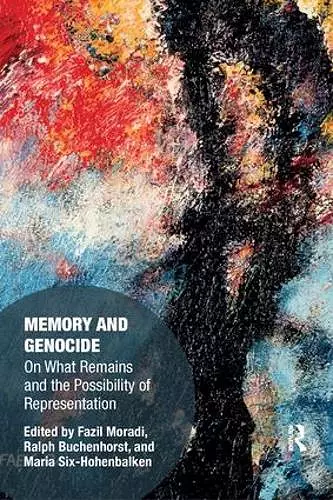Memory and Genocide
On What Remains and the Possibility of Representation
Maria Six-Hohenbalken editor Fazil Moradi editor Ralph Buchenhorst editor
Format:Paperback
Publisher:Taylor & Francis Ltd
Published:18th Oct '18
Currently unavailable, and unfortunately no date known when it will be back
This paperback is available in another edition too:
- Hardback£145.00(9781472482013)

This book focuses on the ethical, aesthetic, and scholarly dimensions of how genocide-related works of art, documentary films, poetry and performance, museums and monuments, music, dance, image, law, memory narratives, spiritual bonds, and ruins are translated and take place as translations of acts of genocide. It shows how genocide-related modes of representation are acts of translation which displace and produce memory and acts of remembrance of genocidal violence as inheritance of the past in a future present. Thus, the possibility of representation is examined in light of what remains in the aftermath where the past and the future are inseparable companions and we find the idea of the untranslatability in acts of genocide. By opening up both the past and lived experiences of genocidal violence as and through multiple acts of translation, this volume marks a heterogeneous turn towards the future, and one which will be of interest to all scholars and students of memory and genocide studies, transitional justice, sociology, psychology, and social anthropology.
'When the survivors of genocide have passed away, their testimonies have aged, and guilty camps have turned into museums, then this superb collection will help us understand the unending attempts to remember and represent the horrendous violence in performances, narratives, and art works.' - Antonius C. G. M. Robben, Utrecht University, Netherlands, author of Political Violence and Trauma in Argentina
‘This remarkable collection engages with the challenging problem of how human beings cope with genocidal violence, through narratives, performances, visual representations and other modes of translation and remembrance. These richly contextualized case studies go a long way towards reminding us that extreme violence can be an occasion for socially productive forms of narration and recollection which resist the utter despair and speechlessness that accompany genocide.’ - Arjun Appadurai, New York University, USA
ISBN: 9780367085360
Dimensions: unknown
Weight: 370g
182 pages